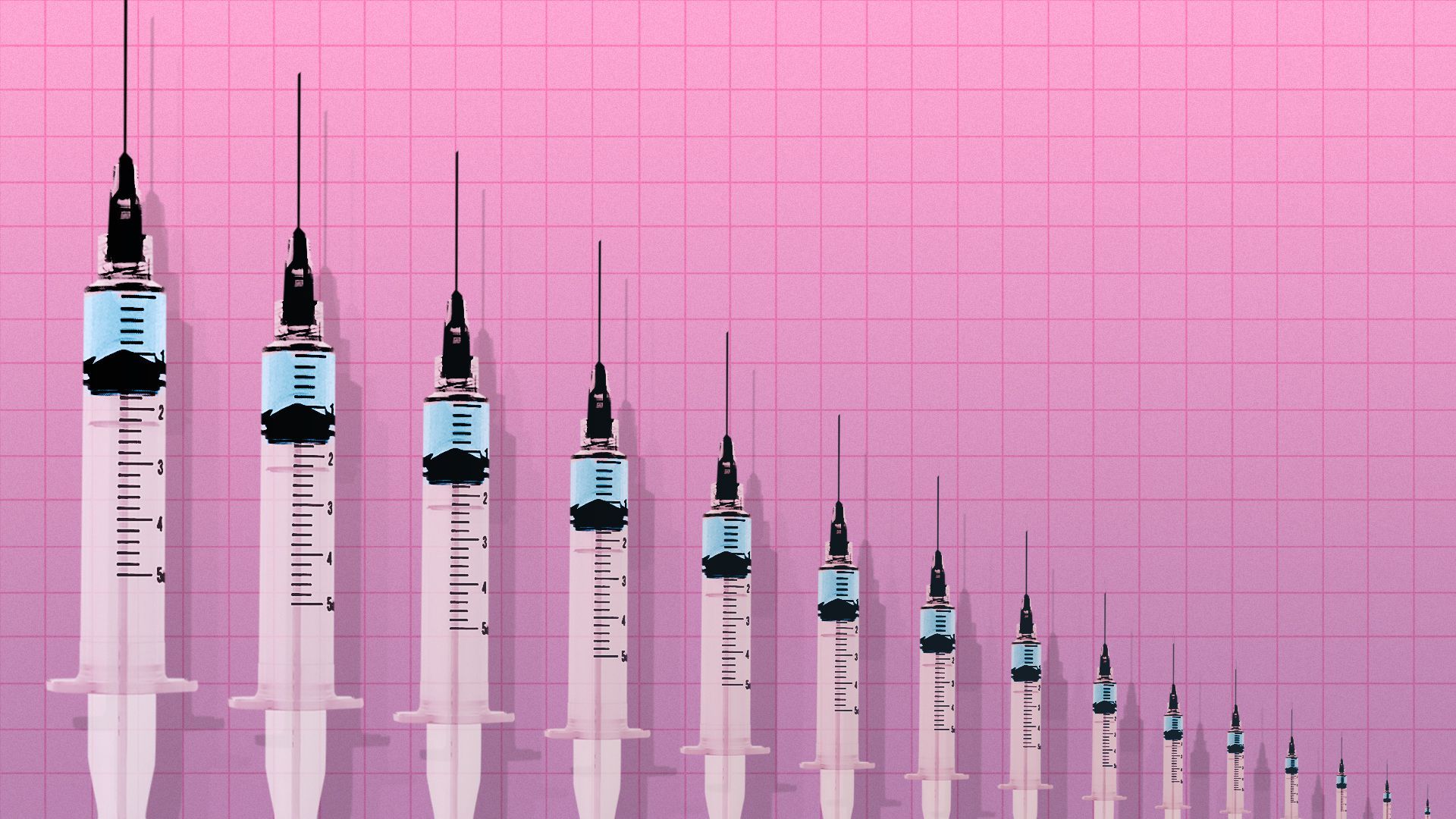
Illustration: Shoshana Gordon/Axios
The Biden administration is intensely scrutinizing coronavirus vaccines' effectiveness over time, facing the daunting task of timing booster shots right while still convincing the unvaccinated that getting the jab is worthwhile.
The bottom line: The vaccines still work incredibly well at protecting against severe disease and death, meaning the benefits of getting vaccinated are immense. But it's less clear how well they're working at preventing infection, which has huge public health implications with so many Americans still unvaccinated.
“I think everybody believes this wanes over time, the question is to what extent,” a senior Biden official said. “Nobody wants to be behind the eight-ball here. We want to catch it before there’s an issue, and that’s why there is very intense scrutiny.”
- But getting the timing right won't be easy, especially without better data than we have now.
- “By the time we have the data that efficacy is declining, we’re already behind,” said a person close to the administration. “A public health decision can be made on imperfect data. So are you waiting for a ton of breakthrough cases and a ton of death and disease before you boost everyone? That’s not a good idea.”
Where it stands: All of the vaccines continue to offer almost 100% protection against death, and extremely strong protection against serious illness. Those findings have stayed consistent across the whole world.
- But a growing body of research shows that the vaccines are losing some potency against milder infections.
- At an individual level, that’s not a huge deal. But on a population level, it has tremendous consequences, as the data also suggests that people with breakthrough cases can effectively transmit the virus.
- More transmission means more disease among the unvaccinated, and more disease among the unvaccinated means — as we’re seeing play out in the South — increasingly overwhelmed health systems.
- And, ultimately, the more the virus spreads, the more likely it is that new variants emerge.
Details: Specific numbers vary from study to study and country to country, but directionally, there seems to be a clear trend:
- Preliminary findings from the Mayo Clinic, which have not yet been peer-reviewed, show that the Pfizer vaccine is preventing significantly fewer infections now than it was before the Delta variant became dominant in the U.S. The same study found a smaller drop in the Moderna vaccine’s efficacy.
- The study has raised alarm bells within the Biden administration, as Axios reported yesterday.
- Pfizer itself has said it believes its vaccines are losing around six percentage points of efficacy every two months.
- And research from Israel and the U.K. reached similar conclusions, and Moderna has also said it believes boosters will be necessary.
The big question: If the vaccines are losing some of their punch against mild infections now, will they eventually become less effective against severe disease?
- "There’s very intense scrutiny on whether there is waning against hospitalization," the senior Biden official said.
- That hasn’t happened yet — every study continues to show that vaccinated people have near-total protection from death and hospitalization.
- But neither the administration nor vaccine manufacturers want to take any chances.
- “There is decreased efficacy against asymptomatic infection. While there's uncertainty, with Delta, it appears to be more important,” the source said.
What’s next: There’s a relatively simple solution to this problem — booster shots. Pfizer and Moderna are already working on them, and Israel has had good results after beginning to offer additional doses to older citizens.
- Third doses will be expensive, and critics say the U.S. shouldn’t be buying up third doses while so much of the world is waiting for its first.
Between the lines: The mounting evidence of waning efficacy adds new urgency to the debate in the U.S. about boosters, but that debate is hamstrung by a severe lack of clear data from the CDC.
- Experts trying to parse how well the vaccines are performing are relying heavily on data from other countries, in part, because the CDC has released very little formal data about the U.S. experience in the months since Delta became dominant.
- Even top administration officials can’t get the information they want, making it harder to assess when boosters will be needed, and for whom.
The bottom line: "The vaccines are still having a positive impact. But we're painting this train as it goes 180 miles an hour," said Michael Osterholm, director of the Center for Infectious Disease Research and Policy.

